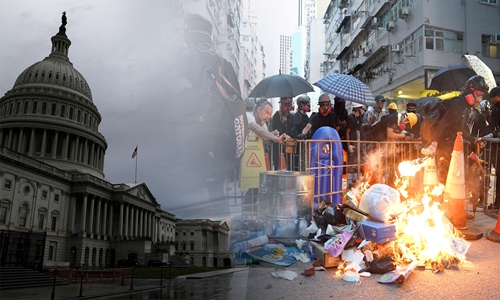HOME >> OPINION
Washington trying to use Hong Kong law, Uyghur bill to pressure Beijing
Source:Global Times Published: 2019/12/12 16:48:40

Photo: VCG/Xinhua
After US President Donald Trump signed the so-called Human Rights and Democracy Act into law on November 27, the US House of Representatives approved the so-called Uyghur Human Rights Policy Act on December 3. Both bills grossly interfere in China's domestic affairs.The US has been tarnishing China's human rights and democratic freedoms record for years. For example, US meddling with Hong Kong began with the so-called US-Hong Kong Policy Act of 1992, which allows Washington to treat the city separately from those in the Chinese mainland for matters of trade and economy after Hong Kong's return to China in 1997.
The US has regarded China's rise as a threat and challenge, thus launching a trade war against China and piling pressure on the country under the pretext of so-called human rights issues in China's Xinjiang Uyghur Autonomous Region and the Hong Kong Special Administrative Region, so as to contain China's development.
Furthermore, Some US politicians intend to make a fuss over China in a bid to reap political benefits - winning more votes from the electorate. This is increasingly evident as the 2020 presidential election approaches.
Some US lawmakers might not be seriously against China, nor have a deep understanding of affairs in both Hong Kong and Xinjiang. They simply believe voting with the majority would be the safest way to avoid unnecessary trouble.
It turns out the measures taken by the Chinese central government in fighting terrorism and extremism in Xinjiang have been effective. There has been no violent terrorist attack in Xinjiang for three consecutive years. The mainstream of society in Xinjiang supports the policies carried out in the region.
However, Washington has repeatedly shown double standards. The US has adopted a zero-tolerance attitude toward terrorism on its own soil, but has been pointing a finger at China's count-terrorism and de-radicalization efforts. The US believes what it has done is justified in the name of safeguarding US national interests, while it applies a different set of standards when dealing with other countries and regions.
When it comes to the so-called Hong Kong Human Rights and Democracy Act, the version passed by US Senate was not exactly the one approved by the US House of Representatives in October. But the latter passed the bill only a day after the Senate approved it. It implies that what the two chambers are really cared about is not the content of the bill. All they want is using it to pile pressure on China. It is likely to be the same with the Xinjiang bill.
If the bill on Xinjiang is also passed by the two chambers, Trump is likely to sign it. Actually, Trump is not concerned about the affairs of Hong Kong or Xinjiang. When asked about protests in Hong Kong in August, Trump told reporters, "That's between Hong Kong and that's between China, because Hong Kong is a part of China. They'll have to deal with that themselves. They don't need advice."
That was the last time Trump made such a statement on Hong Kong. Given the political atmosphere in the US now, it may not be politically correct for him to express such opinion again.
Despite not being so concerned about the so-called human rights issues in Xinjiang, Trump will find it is not wise to veto the bill if it is overwhelmingly approved by the Congress in the future. After all, Trump lacks political experience and his approval rating is not that high for the moment.
The two bills will further harm Beijing-Washington relations and will, to some extent, have a negative impact on the ongoing trade negotiations. Xinjiang and Hong Kong are inalienable territories of China. The Asian giant has the capability to take the overall situation under control. Washington's provocations will hardly produce any substantial effect on Beijing.
US hegemony has existed for decades. Recent US moves to crank up unilateralism, stymie globalization and multilateral cooperation, which other countries are clearly aware of, have undermined its international image. China should devote more time and resources to the development of Xinjiang and Hong Kong while keeping improving the living standards of local people. This will be the best response to US provocation.
The article was compiled by Global Times reporter Lu Yuanzhi based on an interview with Yuan Zheng, director and senior fellow of Division of American Diplomacy Studies, Institute of American Studies, Chinese Academy of Social Sciences. opinion@globaltimes.com.cn
Posted in: VIEWPOINT